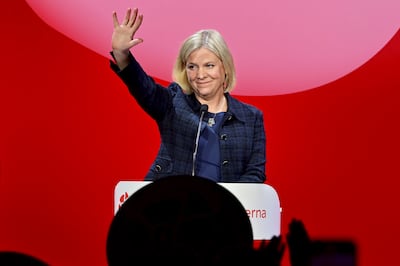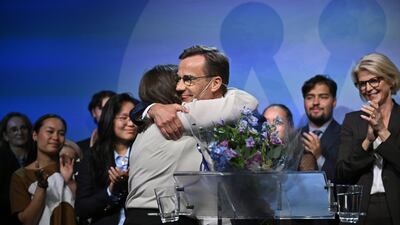Sweden’s far-right made strong gains in Sunday’s knife-edge general election, suggesting a shift in direction after eight years of Social Democrat rule thanks in large part to a campaign dominated by voters' fears of gang violence.
More than 94 per cent of the vote had been counted on Monday. They indicated that the country’s opposition right-wing bloc had a narrow lead of just one seat - 175 out of 349 - over the governing Social Democrats and their allies in the centre-left bloc headed by Prime Minister Magdalena Andersson.
Results may yet change. The election authority said a definitive outcome would not be known before Wednesday, when the uncounted votes, including those cast abroad, have been tallied. Overseas postal ballots have historically tended to favour the right.
Ms Andersson did not concede defeat on election night, saying results were too close to call. The Social Democrats, who have been in power in Sweden since 2014, remain the largest party with 30.5 per cent of the vote.

If the results are confirmed, Sweden, which has long prided itself on being a bastion of tolerance, is likely to become less open to immigrants, even as the Russian invasion of Ukraine continues to force people to flee and climate change is pushing many to leave Africa.
Political historian Torbjorn Nilsson told The National that immigration policy in Sweden is "already severe, due to the Social Democrats changing policy." But he added that family reunion for refugees "will probably be rendered more difficult."
The high score of the Sweden Democrats, which were sidelined for decades because of their neo-Nazi roots, was the topic of intense discussion in national media.
The party garnered nearly 21 per cent of the vote, their biggest result ever, thanks in part to promises to clamp down on shootings and crime.
"It is the Sweden Democrats who have driven the right-wing bloc along, both in terms of shaping the political content and in attracting voters to the constellation," the independent liberal newspaper Goteborgsposten wrote.
"For Sweden, a new political era awaits."
Moderate leader Ulf Kristersson is likely to be the right's candidate for prime minister.
Mr Kristersson has said that he would seek to form a government with the small Christian Democrats and, possibly, the Liberals, and only rely on the far-right Swedish Democrats' support in Parliament. But it may be hard for him to keep at arm's length a party that is set to be bigger than his own.
"Right now, it looks like there will be a change of power. Our ambition is to sit in the government," Sweden Democrat leader Jimmie Akesson told supporters at a post-election party.
It is unlikely that the Sweden Democrats will join a new government immediately, said Mr Nilsson, but that it might "after a year or so" if developments outside the country, such as the ongoing war in Ukraine, forces a more stable government.
The Sweden Democrats owe their large gains in part to promises to clamp down on shootings and crime.
Mr Nilsson told The National that the escalation of shooting has been an important issue in Sweden for the past years. The Moderates also campaigned on the issue, but not as sucessfully as the Swedish Democrats.
"Maybe the right voters preferred the original and not the copy," he said.
When Mr Kristersson took over as leader of the Moderates in 2017, the Sweden Democrats were shunned by the right and left.
But he has gradually deepened cross-party ties since a 2018 election loss and the Sweden Democrats are increasingly seen as part of the mainstream right. They moderated some policies such as dropping plans to leave the European Union.
The aim of the Moderates has been to build a majority, not necessarily with all parties in government, but which must integrate the Sweden Democrats, said Mr Nilsson.
"Whatever the Moderate party says about differences between the Moderates and the Sweden Democrats, the effect will be accepting the Sweden Democrats as a normal party. Maybe not mainstream, but a party one can cooperate with," Mr Nilsson told The National.
Mr Kristersson has vowed to crack down on crime and "straighten out" a Sweden that in his view has lost control over too many issues, ranging from soaring gang shootings to high unemployment and midwife shortages to disorderly school classrooms.
Agencies contributed to this report


